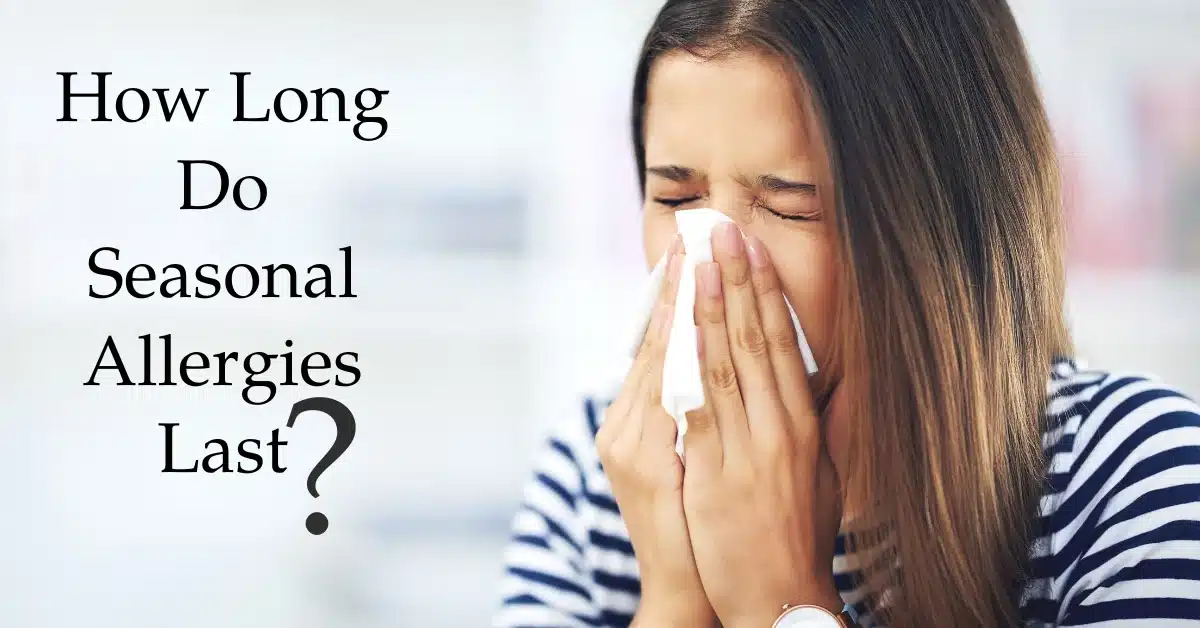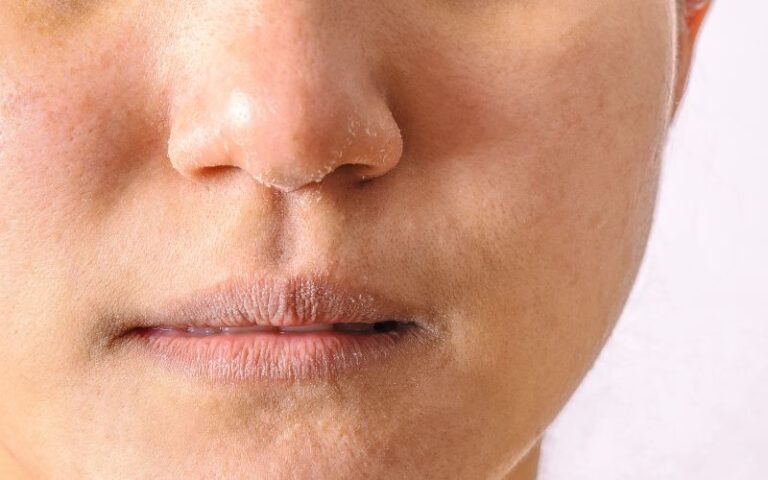How Long Do Seasonal Allergies Last

As the world dances through the seasons, embracing the delightful transitions of spring blooms, summer warmth, fall foliage, and winter wonderlands, a significant number of people find themselves locked in a perennial battle with seasonal allergies.
Seasonal allergies, also known as hay fever or allergic rhinitis, are triggered by airborne substances like pollen, mold spores, and other allergens that are released during specific times of the year. When these allergens come into contact with sensitive nasal passages, they set off an immune response, causing symptoms including such as sneezing, runny nose, itchy eyes, itchy skin, and nasal congestion.
In this article, we will explore the duration of seasonal allergies, from the moment they strike to their eventual retreat, providing insights into specific seasonal allergies such as spring, grass, fall, winter, and cedar. Moreover, we will delve into the longevity of seasonal allergy symptoms and their impact on our lives. So, grab a tissue, and let’s journey into the realm of seasonal allergies!
Table Of Contents
- How Long Do Seasonal Allergies Last?
- Factors That Influence The Duration Of Seasonal Allergies
- The Prolonged Effects of Seasonal Allergy Symptoms
- Tips For Managing Seasonal Allergies
- When To See A Doctor For Seasonal Allergies
- The Takeaway
How Long Do Seasonal Allergies Last?
The duration of seasonal allergies varies depending on the allergen, individual sensitivity, and the local climate. Typically, seasonal allergies can last anywhere from a few weeks to several months. Let’s explore the longevity of various seasonal allergies and their impact on different times of the year.
How Long Do Spring Allergies Last?
Spring, a season celebrated for its rejuvenation and blossoming beauty, is also notorious for triggering spring allergies. Trees, such as birch, oak, cedar, and maple, release copious amounts of pollen during this period.
For many allergy sufferers, spring allergies may begin as early as late February and can last through April or May. However, the duration may vary based on geographical location and the specific tree pollens prevalent in the area.
How Long Do Grass Allergies Last?
As spring transitions into summer, grasses become a prominent source of allergens. Common grasses like Bermuda, Timothy, and Kentucky Bluegrass release pollen, wreaking havoc for those susceptible to grass allergies.
Grass allergy season typically spans from late spring to early summer, generally from May to June. Again, the timing and duration may differ depending on the region and grass species.
How Long Do Fall Allergies Last?
The arrival of fall brings a breathtaking display of vibrant foliage, but it also introduces another wave of allergens. Weeds, such as ragweed, sagebrush, and lamb’s quarters, release pollen during the fall season, affecting many allergy sufferers.
Fall allergy symptoms can commence as early as August and extend through October or November.
How Long Do Winter Allergies Last?
Winter may provide a respite for some allergy sufferers, as pollen levels are significantly lower during this time. However, for others, indoor allergens like mold spores and pet dander can trigger allergic reactions.
Winter allergies may persist throughout the season, especially in regions with mild climates where indoor allergens thrive.
How Long Do Cedar Allergies Last?
Cedar allergies can be particularly troublesome for individuals living in areas with cedar trees, such as the mountainous regions of Texas, New Mexico, and parts of Japan. The cedar pollen released during the winter months can lead to persistent allergy symptoms from December to February, affecting many locals and visitors alike.
Factors That Influence The Duration Of Seasonal Allergies
Several factors can influence the duration and severity of seasonal allergies. These factors include:
- Geographical Location: The timing and duration of allergy seasons can vary depending on the region. For example, in areas with mild climates, allergy seasons may be longer and more extended.
- Weather Conditions: Weather patterns, such as temperature, humidity, and wind, can affect the distribution and concentration of allergens in the air. Dry and windy conditions can lead to higher pollen counts, exacerbating allergy symptoms.
- Individual Immune Response: Each person’s immune system is unique, and some individuals may have a more robust immune response to allergens, leading to more severe and prolonged allergy symptoms.
- Exposure to Allergens: The frequency and duration of exposure to allergens can also affect the duration of seasonal allergies. Individuals who experience frequent exposure to high levels of allergens may see longer-lasting symptoms.
- Preventive Measures: Taking proactive measures to minimize exposure to allergens, such as using air purifiers and keeping windows closed, can help reduce the duration and severity of seasonal allergies.
By understanding these factors, individuals can better manage their seasonal allergies and take appropriate steps to alleviate symptoms.
The Prolonged Effects of Seasonal Allergy Symptoms
The prolonged effects of seasonal allergy symptoms can significantly impact the quality of life for individuals who suffer from allergic rhinitis or hay fever. While seasonal allergies are often seen as a temporary nuisance, they can have more lasting consequences on both physical and emotional well-being.
Physical Impact
- Chronic Nasal Congestion: Persistent nasal congestion can make breathing difficult, disrupt sleep patterns, and lead to fatigue and irritability. It may also affect the sense of smell, diminishing the ability to fully enjoy food and the environment.
- Sinusitis: Repeated exposure to allergens can cause inflammation in the sinuses, leading to sinusitis – a condition characterized by pain, pressure, and congestion in the forehead, cheeks, and nose. Sinusitis may require medical treatment to resolve.
- Ear Problems: Allergies can affect the Eustachian tubes, leading to ear-related problems like ear infections, fullness in the ears, and reduced hearing.
- Respiratory Issues: In some cases, seasonal allergies can induce or exacerbate asthma symptoms, leading to wheezing, coughing, and shortness of breath.
Emotional and Psychological Impact
- Frustration and Irritability: Dealing with persistent allergy symptoms can be frustrating and wearisome, leading to increased irritability and decreased tolerance for daily stressors.
- Social Withdrawal: Chronic allergy symptoms can cause individuals to withdraw from social activities and gatherings to avoid triggers, leading to feelings of isolation and loneliness.
- Impact on Sleep: Difficulty sleeping due to nasal congestion and other allergy-related issues can lead to sleep deprivation, affecting mood, cognitive function, and overall well-being.
- Reduced Productivity: Allergies can hamper productivity at work or school due to reduced focus and energy levels caused by bothersome symptoms.
- Mental Health: For some individuals, the ongoing battle with allergies may contribute to anxiety or depression, particularly if the condition significantly affects daily life and overall happiness.
Managing Prolonged Allergy Symptoms
Fortunately, several strategies can help manage and alleviate the prolonged effects of seasonal allergy symptoms:
- Allergen Avoidance: Identify and avoid specific allergens that trigger symptoms. Keep windows closed during high pollen days, use air purifiers indoors, and avoid outdoor activities during peak pollen times.
- Medications: Over-the-counter antihistamines, decongestants, and nasal corticosteroids can provide relief from allergy symptoms. Consult with a healthcare professional to determine the most appropriate medications for individual needs.
- Immunotherapy: For severe or persistent allergies, allergen immunotherapy (allergy shots) may be recommended. This treatment gradually exposes the individual to small amounts of the allergen to desensitize the immune system and reduce symptoms over time.
- Nasal Rinses: Saline nasal rinses can help flush out allergens and relieve nasal congestion.
- Personal Hygiene: Regularly washing clothes, bedding, and hair can help reduce allergen exposure.
- Consult a Healthcare Professional: If seasonal allergies significantly impact daily life or if symptoms persist despite over-the-counter remedies, seeking medical advice from an allergist or immunologist is essential for proper diagnosis and personalized management.
Tips For Managing Seasonal Allergies
While seasonal allergies can be bothersome, there are several strategies that can help manage and alleviate symptoms.
Tips for managing seasonal allergies:
- Monitor Pollen Counts: Check local pollen counts and plan outdoor activities accordingly, avoiding peak pollen times like early mornings and windy days.
- Keep Windows Closed: Prevent allergens from entering your home by keeping windows closed during high pollen periods. Use air conditioning or fans for indoor air circulation.
- Practice Good Hygiene: Wash hands frequently and shower after being outside to remove pollen from skin and hair.
- Wear Sunglasses: Protect your eyes from allergens with sunglasses to reduce itchiness and redness.
- Use Nasal Rinses: Flush allergens from nasal passages with saline rinses to relieve congestion and symptoms temporarily.
- Consider Over-The-Counter Medications: Temporary relief from allergy symptoms can be achieved with antihistamines, nasal sprays, and eye drops. Consult a healthcare professional for the best medication for you.
- Avoid Triggers: Identify and steer clear of allergens that trigger your symptoms. For instance, if grass pollen is an issue, avoid mowing the lawn or spending time on freshly cut grass.
- Create an Allergen-Free Environment: Reduce exposure to dust mites by using allergen-proof pillow cases and mattress covers. Regularly clean and vacuum your home to remove allergens.
When To See A Doctor For Seasonal Allergies
You should see a doctor for seasonal allergies if:
- Over-the-counter remedies don’t provide sufficient relief.
- Symptoms persist or worsen over time.
- Allergy symptoms interfere with daily activities or sleep.
- You experience asthma-like symptoms (e.g., coughing, wheezing).
- Allergy medications cause adverse side effects.
- You need allergy testing to identify specific triggers.
- Considering allergen immunotherapy (allergy shots).
- Have concerns about underlying health conditions.
- Symptoms are recurrent and significantly affect your well-being.
- To receive expert guidance and personalized treatment for effective allergy management.
The Takeaway
As the seasons continue to embrace their unique charm, seasonal allergies weave their way into the lives of countless individuals. Spring, grass, fall, winter, and cedar allergies each make their appearance, leaving their mark on the affected individuals. The prolonged effects of seasonal allergy symptoms can be challenging to endure, but with proper management and awareness, the burden can be alleviated.
So, the next time you find yourself caught in the throes of seasonal allergies, take solace in the knowledge that nature’s challenges are temporary. Embrace the beauty of each season and equip yourself with knowledge and remedies to confront seasonal allergies, ensuring that the dance of life continues unhindered by these transient obstacles.
FAQs
Q: How long do spring allergies last?
A: Spring allergies typically last from late February to April or May, depending on the region and tree pollen levels.
Q: How long do grass allergies last?
A: Grass allergies can persist from May to June, coinciding with the peak season of grass pollen.
Q: How long do fall allergies last?
A: Fall allergies, triggered by weed pollen like ragweed, generally last from August to October or November.
Q: How long do winter allergies last?
A: While winter allergies are less common, indoor allergens like mold spores may cause symptoms throughout the season.
Q: How long do cedar allergies last?
A: Cedar allergies can affect individuals from December to February, as cedar pollen levels rise during this period.
Q: How long can seasonal allergy symptoms last?
A: Allergy symptoms may persist as long as there is exposure to allergens, varying from weeks to several months.
Q: What can I do to reduce the duration of seasonal allergies?
A: Taking allergy medications, avoiding triggers, and seeking medical advice for immunotherapy can help manage and shorten allergy duration.
Q: Do seasonal allergies last all year round?
A: No, seasonal allergies occur during specific times of the year when allergens are prevalent, not throughout the entire year.
Q: Can seasonal allergies lead to chronic allergic rhinitis?
A: Yes, if untreated or poorly managed, seasonal allergies can progress into chronic allergic rhinitis with persistent symptoms.
Q: When should I consult a doctor for seasonal allergies?
A: If over-the-counter remedies are ineffective or symptoms interfere with daily life, seeking medical advice is recommended.
References
https://acaai.org/allergies/allergic-conditions/seasonal-allergies/
https://molekule.com/blogs/all/how-long-do-seasonal-allergies-last-air-purification-molekule





